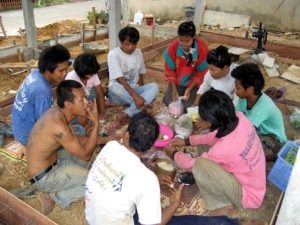Migrant Rights Activist Flees Thailand
 British migrant rights activist Andy Hall fled Thailand, citing fears of criminal persecution and harassment, on November 6. Hall has been living in Thailand and Myanmar for the past 11 years, where he has campaigned for migrant rights in Southeast Asia through investigative journalism and reporting.
British migrant rights activist Andy Hall fled Thailand, citing fears of criminal persecution and harassment, on November 6. Hall has been living in Thailand and Myanmar for the past 11 years, where he has campaigned for migrant rights in Southeast Asia through investigative journalism and reporting.
Hall fled Thailand after the Bangkok criminal court charged the activist with criminal defamation in October, following his contributions and research in a report published by the NGO Finnwatch. The report describes the migrant labor abuses carried out under the Natural Fruit Company, a Thai fruit and pineapple wholesale firm. Hall was sentenced to three years in prison and and fined for 150,000 Thai Baht. Though the Supreme Court dismissed this initial charge, Hall still faces two additional court cases in Bangkok and Nakhon Pathom, which could leave him with a sentence of seven years of jail time.
Wirach Piyapornphaiboon, the President of Finnwatch, blasted Hall’s charges, alleging that Hall had been “made a scapegoat in order to stifle other voices that speak out legitimately in support of migrant worker rights.” Piyapornphaiboon also called the decision “a sad day for freedom of expression in Thailand.” Indeed, in recent years, there has been much controversy in Thailand about both workers’ rights and freedom of expression.
Despite the fact that Thailand guaranteed the right to Freedom of Speech in both the 1997 and 2007 constitutions, many are dissatisfied with what they believe to be strict controls and limits on the freedom in practice. Perhaps most publicized are the Lese Majeste Laws, which make it illegal to criticize the monarchy. Critics like Amnesty International argue that the laws are used to “silence peaceful dissent and jail prisoners of conscience.” However, supporters like current Prime Minister Prayuth Chan-O-cha say that they are necessary to “protect the monarchy” and ensure the stability of the nation.
Other forms of media are also subject to some form of government oversight. Justin Heifetz, a Western journalist who worked for the Bangkok Post, describes newspapers in Thailand as “only useful until we disrupt the cozy relationship between government and media.” His statement underscored the government’s alleged unethical practices of oppression of freedom of expression, self-censorship, and forced recitation of stories. The Post has vigorously denied these allegations. Meanwhile, independent journalists like Andrew Drummond, who is most notable for his investigations into Bangkok’s Boiler Room Bosses, left Thailand in 2015, citing alleged threats from both criminals and policemen who were in liaison with him.
A different set of challenges faces migrant workers in Thailand. Hall’s report of the human rights abuses under the Natural Fruit Company included interviews with migrant workers from Myanmar who worked in Natural Fruit Company’s plant in the south of Thailand. The migrant workers claimed that the company paid the workers below minimum wage, refused them holiday and sick leave, and employed children. Also of particular contention were the investigations of Thailand’s fishing industry, which revealed its reliance on slave labor and its practice of withholding wages.
This mistreatment of employees is not an uncommon sight. Despite the current Thai government’s promises to crack down on the industry, not much change has been reported thus far— perhaps due to the enormous scale of the $4.6 billion industry. For both journalists and migrant workers, Thailand remains a place where persecution may continue to persist in the future.
